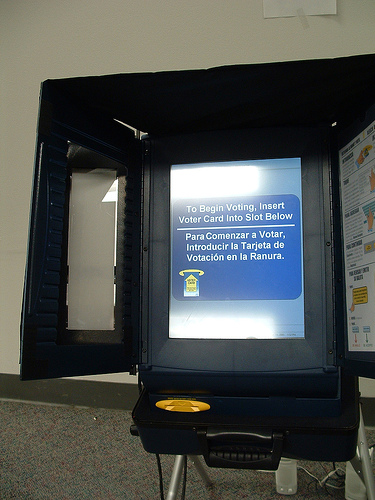


It’s been a little over a year since Mark Perriello assumed leadership of the American Association of People with Disabilities (AAPD). The former strategist for the Gay & Lesbian Victory Fund and Leadership Institute put an immediate emphasis on political involvement, saying in his introductory press release: “We must enlist our friends, family members and co-workers to talk with their elected officials and to vote in order to increase our voice in Washington D.C. and in state capitals across the nation.”
In some ways, the voter disenfranchisement scandal may have positive results for people with disabilities, as it becomes more clear that the proposed ID laws in some states like Pennsylvania, Maine, and Florida will disproportionately impact these individuals. As Don C. Reed points out in this July 18 article for The Huffington Post, the 3.4 million Americans who are blind probably have never had reason or opportunity to keep a valid driver’s license.
There is also this excellent article by two Arizona State University journalism students, Emily Nohr and Alissa Skelton, that was published yesterday for the News21 special section on Voting Rights. The article includes an interview with a very determined woman named Karin Kellas, whose legs were amputated following a spinal cord injury caused by a car accident:
‘I’ve heard a lot of (disabled) people feel their voice doesn’t count,’ she said. ‘We need to make our opinions known and vote because that’s how we make any kind of change.’ Kellas votes absentee so she can skip the lines and volunteer to work the polls. If she wanted to vote in a traditional polling place, she’d find a way to get there as she did in the past. She wants voting to be ‘as easy and accessible for able-bodied people as it is for disabled people.’ ‘I’m the exception to the rule because I don’t take no for an answer,’ Kellas said. ‘There has to be a way I can vote.’
It’s heartening to see communities like Montgomery County, Alabama, take the issue of accessibility seriously with elections just around the corner. This Montgomery Advertiser story, re-posted to Global Accessibility News, says the voting commission is taking a proactive approach to ensuring accessibility, even spending $13,478 to make a parking lot accessible at one particular polling station. Contrast that with blogger Elaine Canedy’s experience in her Phillips County, Arkansas, precinct, where lack of accessibility leaves people in wheelchairs with no protections of their voting privacy.
Voting is crucial, but one must be fully informed about candidate’s stances on issues in order to make it count; which makes it all the more aggravating when we have answers from one presidential candidate on health care, employment opportunities, education, and career training for people with disabilities; while the other has so far declined to share any specifics. A group of Ohioans have formed the National Forum on Disability Issues (NFDI), which is entreating both major party candidates to take part in a live event on September 28 in the city of Columbus. Not only will Barack Obama and Mitt Romney have the chance to communicate with voters in a key state for electoral college votes, but a live Internet stream will provide a platform to speak to all Americans with disabilities.
The folks at the NFDI are also inviting the candidates for Ohio’s seat in the U.S. Senate to the forum; underscoring the importance of paying attention to elections at every level of government, including state and local races where concerns will vary based on the community. In Fort Wayne, Indiana, for example, more jobs for people with disabilities and Medicaid are important, according to this story from Indiana’s News Center correspondent Rachel Martin, but of greater concern is the lack of accessibility found in the the city’s bus system.
Meanwhile, our neighbors to the north hosted a July 29 forum on disability issues that was attended by all six major party candidates currently in the race to be New Hampshire’s next governor. Concord Monitor reporter Matthew Spolar noted that everyone pledged to end the waiting list for developmental disability services, though their methods to accomplish this took many forms.
Voting time is fast approaching here in Massachusetts; primary elections are on September 6. The Democratic Underground website has put all pertinent links and information about voter registration, absentee ballots, and polling locations for the state here on one convenient page.
So get out and exercise your right as an American and help make life matter for people with disabilities; and if you can’t figure out which candidate to vote for, remember the words of our sixth U.S. President, John Quincy Adams, who said, “always vote for principle, though you may vote alone, and you may cherish the sweetest reflection that your vote is never lost.”
Comments?
Image by joebeone (Joe Hall).